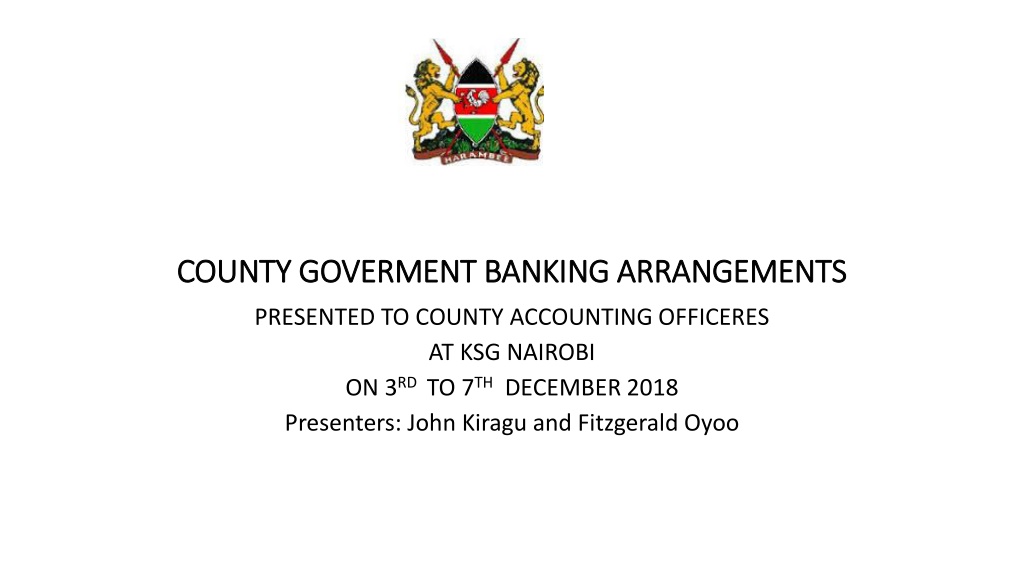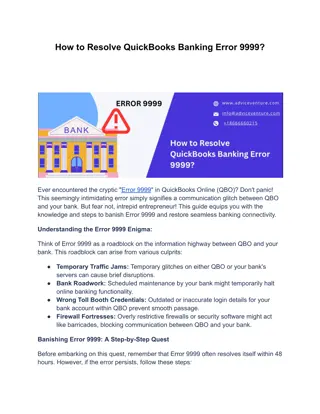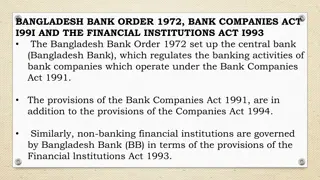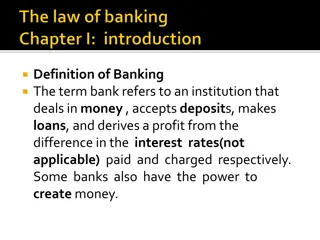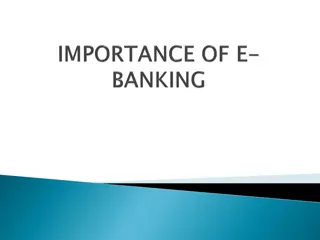County Government Banking Arrangements Presentation
This presentation outlines the County Government's banking arrangements, cash management, and the roles of accounting officers in ensuring effective financial management. It emphasizes the importance of maintaining internal controls, preparing accurate financial reports, and transferring funds only to entities with transparent financial systems. The County Treasury is responsible for administering the County Revenue Fund in compliance with constitutional provisions, including controlling revenue receipts and withdrawals based on appropriations by the County Assembly.
Download Presentation

Please find below an Image/Link to download the presentation.
The content on the website is provided AS IS for your information and personal use only. It may not be sold, licensed, or shared on other websites without obtaining consent from the author. Download presentation by click this link. If you encounter any issues during the download, it is possible that the publisher has removed the file from their server.
E N D
Presentation Transcript
https://encrypted-tbn2.gstatic.com/images?q=tbn:ANd9GcQyNL-ExabMe27cM28iAK9aSKLsXbhLVDqmczC9WDTC4czOaYfM7Arc3Be9https://encrypted-tbn2.gstatic.com/images?q=tbn:ANd9GcQyNL-ExabMe27cM28iAK9aSKLsXbhLVDqmczC9WDTC4czOaYfM7Arc3Be9 COUNTY GOVERMENT BANKING ARRANGEMENTS COUNTY GOVERMENT BANKING ARRANGEMENTS PRESENTED TO COUNTY ACCOUNTING OFFICERES AT KSG NAIROBI ON 3RD TO 7THDECEMBER 2018 Presenters: John Kiragu and Fitzgerald Oyoo
Presentation Outline Presentation Outline Introduction County Treasury and Cash Management Cash and Banking Arrangements Sound Cash Management Cash Management Advisory Committee Operation of County Treasury Single Account Audit Issues Related to Cash Management
Introduction Introduction Accounting Officers shall, in accordance with Article 226(2) of the Constitution and Section 149 (1) of the PFM Act, be accountable to the County Assembly (a) for ensuring the most effective means of achieving desired program outcomes are used; (b) for maintaining effective systems of internal control and the measures taken to ensure that they are effective; and (c) for measures taken to prepare the financial reports that reflect a true and fair financial position of the entity.
Introduction Introduction Contd Contd Before transferring any funds to an entity within or outside the county government, ensure that there is a written assurance from the entity that that entity implements effective, efficient and transparent financial management and internal control systems, or, if such written assurance is not or cannot be given, render the transfer of the funds subject to conditions and remedial measures requiring the entity to establish and implement effective, efficient and transparent financial management and internal control systems;
County Treasury and Cash Management County Treasury and Cash Management The County Treasury shall administer the County Revenue Fund in accordance with the Constitutional provisions in Article 207 and 209 (3) and (4) in controlling revenue receipts to ensure that All revenue receipts by the county government are paid into the County Exchequer Account, except revenue receipts reasonably excluded by the Act, or any other Act of Parliament or an Act of County Assembly ; and Withdrawals from the County Revenue Fund are done (i) in accordance with an appropriation by an Act of County Assembly; or (ii) as a direct charge against the County Revenue Fund authorized by the Act, an Act of Parliament or an Act of County Assembly.
County Treasury and Cash Management Contd.. County Treasury and Cash Management Contd.. Receivers of revenue shall promptly deposit into the County exchequer account all receipts due to the County Revenue Fund. The receivers of revenue shall promptly pay the revenue received into the County Revenue Fund , as soon as possible and in any case not later than five (5) working days after receipt thereof.
Cash and Banking Arrangements Cash and Banking Arrangements (1) Subject to the provisions of Section 119 of the PFM Act 2012, the following criteria shall be considered by the County Treasury before granting approval to a county government entity to open and operate a county government bank account (a) All county exchequer accounts shall be opened at the Central Bank of Kenya; (b) For avoidance of doubt, all county government bank accounts shall be opened at the Central Bank of Kenya except for imprest bank accounts for petty cash; (2) All county government entities operating bank accounts outside Central Bank of Kenya shall comply with the provisions under PFM Regulation 2015 within six (6) months from the date of commencement of these Regulation to comply with the regulation.
Cash and Banking Arrangements Contd Cash and Banking Arrangements Contd (3) Except with the prior authority of the County Treasury, no accounting officer may open a bank account for the deposit, custody or withdrawal of public moneys or other moneys for which he or she is responsible in his or her official capacity or for the transaction of official banking business. (4) No official county government bank account shall be overdrawn, nor shall any advance or loan be obtained from a bank account for official purposes beyond the limit authorized by the County Treasury in line with section 119 (4) of the PFM Act. (5) Personal cheques shall not be deposited in an official bank account.
Sound Cash Management Sound Cash Management The County Treasury shall be responsible for establishing sound cash management systems, procedures and processes, to ensure efficient and effective banking and cash management practices. This includes- (a) assessing the cash inflows and outflows expected at any one time; (b) ensuring payments, including transfers to other levels of government and county-government entities are made when due for efficient, effective and economical programme delivery and the county government s normal terms for account; or (c) avoiding accumulation of idle balances; (d) using short term borrowing only when it is necessary;
Sound Cash Management Contd Sound Cash Management Contd (e) avoiding prepayments for goods or services unless required by the contractual arrangements with the supplier; (f) pursuing debtors with appropriate sensitivity and rigour to ensure that amounts receivable by the county government are collected and banked promptly; and (h) recognizing the time value of money and managing inventories to the minimum level necessary for efficient and effective programme delivery, and selling surplus or underutilised assets.
Cash Management Advisory Committee (CMAC) Cash Management Advisory Committee (CMAC) This the committee tasked with the fiscal policy and planning in the counties coordinated cash management and budgetary controls. The CMAC shall be comprised of (a) Chief Officer of the County Treasury who shall be the chairperson or an officer designated by him or her; (b) the department responsible for accounting policy within the County Treasury, which shall also provide the secretariat; (c) the department responsible for economic affairs in the County Treasury; (d) the department responsible for public debt management in the County Treasury; and (e) the department responsible for budget matters in the n the County Treasury.
Responsibilities of the Cash Management Advisory The responsibilities of the Committee shall be determined by the County Executive Committee Member for Finance during its establishment. The County Head of Accountancy Services shall maintain a register of all County Treasury Single Account (CTSA) sub accounts and other bank accounts opened by County government entities including public funds and donor funded projects. The office of the County Head of Accountancy Services shall reconcile periodically the government bank accounts list, with the records maintained by the Central Bank of Kenya and all other Commercial Banks. The Accounting Officer of a county government entity shall, by the 30th September of each year, provide the County Treasury with an up-dated list of bank accounts held by the county government entity.
Responsibilities of the Cash Management Advisory Contd The County Treasury shall, when granting authority to Accounting Officers to open and operate bank accounts, require them to include as a pre- condition to that bank, that the County Executive Committee Member for Finance may request bank statements for that account without any reference to the authorized bank signatories of that bank account. The County Executive Committee Member for Finance may suspend the operations of any county government bank account or impose certain conditions, if he or she reasonably believes the purpose of that account no longer exists, or that fraud or fraudulent transactions are being undertaken in that specific account and shall institute investigations immediately.
Bank Reconciliation Statements Accounting Officers shall ensure bank accounts reconciliations are done for each bank account held by that Accounting Officer, every month and submitted to County Treasury; Accounting Officers shall ensure any discrepancies noted during bank reconciliation exercise are investigated immediately and appropriate action taken including updating the relevant cash books; The County Treasury shall analyze and review the bank reconciliation statements submitted and take the necessary action; It is a requirement the final and quarterly financial statements should contain bank reconciliation statements of the bank accounts operated by county governments.
County Treasury Single Account (CTSA) A CTSA is a unified structure of government bank accounts that aims to consolidate and optimize the use of Government cash resources and having view of government cash resources for purposes of planning and accountability. Each County Treasury shall establish a County Treasury Single Account pursuant to Section 119(2) of the PFMA 2012, and shall be kept at the Central Bank of Kenya The County Treasury shall ensure operating cash balances in the CTSA sub accounts are kept to a minimum through consolidation into a CTSA The CTSA shall reflect a unified banking arrangements to enable the County Treasury to have proper oversight of county government inflows and outflows on these bank accounts
Operation of County Treasury Single Account (CTSA) County Treasury Recurrent A/c Development A/c Imprest A/c Special Purpose A/cs National Treasury Exchequer A/c Revenue Collection A/cs Other A/cs Inflows Outflows Single Account (CTSA)- CRF Transfers Fund A/cs Project A/cs Other A/cs Deposit A/c Unspent Funds (Return to CRF Issues)
Audit Issues Related to Cash Management Audit Issues Related to Cash Management Decrease in own source revenue collections over the years Lack of board of survey reports Delay in remitting Donor Funds (DANIDA) to health centres Unsupported transfer of funds to other county goverment entities as per PFM Reguation Sec 51a (AIEs) Use of multiple Revenue Collections which are not integrated Unbanked revenue (Underbanking)
Audit Issues Related to Cash Management Contd Audit Issues Related to Cash Management Contd Spending own source reveue at source, cash withdrawals from revenue collection accounts,transfer from revenue collection accounts to operatioal acccounts (Imprest Accounts), revenue not tranfered to County Revunue Fund account Non disclosure of bank accounts in financial statements Un authorized budgetary reallocations Multiple revenue collection bank accounts Un receipted banked revenue Un supported waivers Irregular safari imprest, salaries and training expenses paid from retention money (Deposit A/c s)
